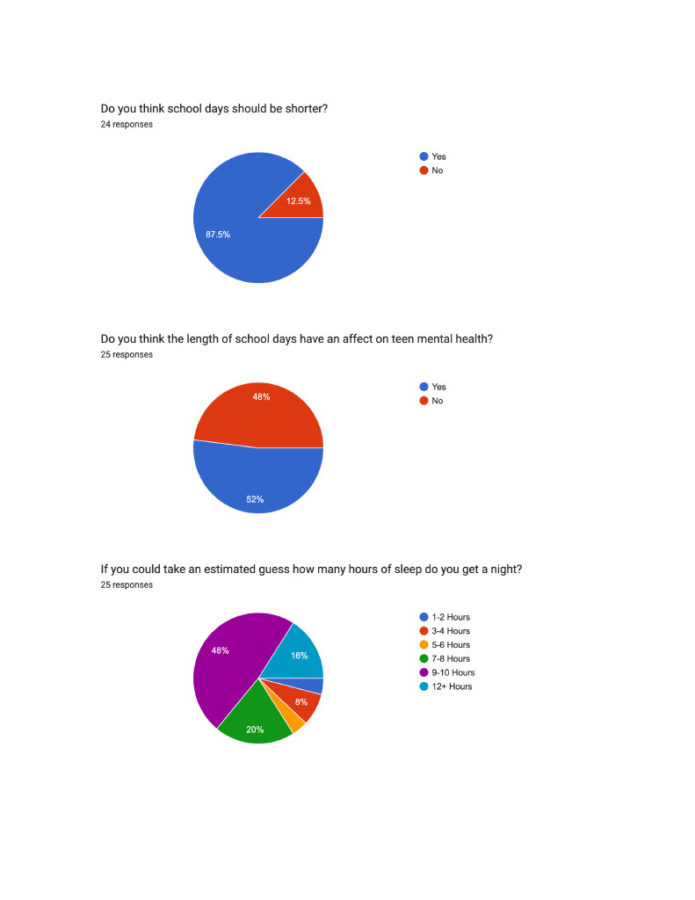Sleep deprivation: How is it affecting students and is there a solution?
This poll shows Hollis Brookline student responses and opinions on school start time and sleep schedule
May 6, 2023
Students and staff often forget the impact sleep has on someone’s everyday life. Those who attend a high school with a relatively early start time know the struggle of being mentally present for their first period. Most students have jobs, sports and other extracurricular activities outside of school. That, on top of nightly homework, typically sets a student’s bedtime at a late and inconvenient hour. Waking up and getting ready for school before 8:00 a.m. can result in sleep deprivation, which has shown negative impacts on both mental health as well as academic performance.
In a report by the Columbia University Department of Psychiatry, students showed signs of insomnia disorder in 20% of the participants. Not only was there a large display of insomnia throughout the trial but also a noted increase in mental distress, thus resulting in higher levels of anxiety and depression. Much of this stress has become more elucidated post-pandemic as numbers were lower before Covid began.
According to Columbia University, insufficient sleep decreases the ability to positively and effectively approach stressors in one’s life, whether that be with a job, at home, or in school.
Furthermore, insufficient sleep can cause a spiral effect, heightening preexisting mental health disorders and ultimately causing even more loss of sleep, as insomnia is a common side effect of depression and anxiety.
Typically, a teenager needs about 9.25 hours of sleep according to Kappan, an online educational research organization. Studies show that on average a teenager typically cannot fall asleep till around 10:45 p.m.
School start times before 8:00 a.m. make this nearly impossible for the majority of teenagers to achieve, which is why many schools have made a switch to start times no earlier than 8:30, giving students an extra 30 to 60 minutes.
This makes some administrators and parents worried about fitting in classes, as well as interference with extracurricular activities. Yet this can easily be solved with an alternate schedule to fit the start time.
A slight change in schedule with possibly a slightly reduced class time, though somewhat inconvenient, wouldn’t show effects on academic performance. In fact, research has shown improvements in test scores and grades with a later start time, as it gives students more time to wake up and be ready to learn. It also gives students more time to study at night without losing the necessary hours of sleep.
Many districts and states as a whole have noticed increased academic achievement when school started at a more lively hour. California in fact passed a law making start times later than 8:30 mandatory statewide.
According to an article by the National Education Association, a study in 2018 based out of Seattle confirmed an average increase of 4.5% in students’ final grades in their first-period classes after adding just 35 extra minutes in the morning.
Works Cited:
Walker, Tim. “Later School Start Times More Popular, but What Are the Drawbacks? | NEA.” Www.nea.org, 1 Dec. 2022, www.nea.org/advocating-for-change/new-from-nea/later-school-start-times-more-popular-what-are-drawbacks. Accessed April 8, 2023.
Wahlstrom, Kyla. “Later Start Time for Teens Improves Grades, Mood, and Safety – Kappanonline.org.” Kappanonline.org, 14 Aug. 2017, kappanonline.org/later-start-time-for-teens/. Accessed April 8, 2023.
Columbia University Department of Psychiatry. “How Sleep Deprivation Impacts Mental Health.” Columbia University Department of Psychiatry, Columbia University, 14 Mar. 2022, www.columbiapsychiatry.org/news/how-sleep-deprivation-affects-your-mental-health. Accessed April 8, 2023.















